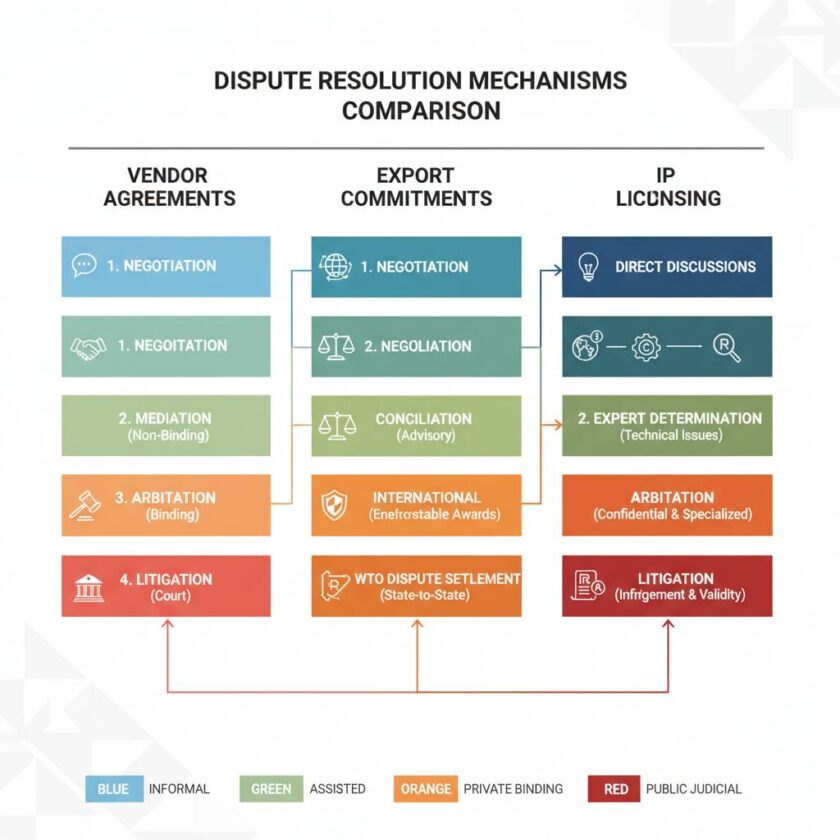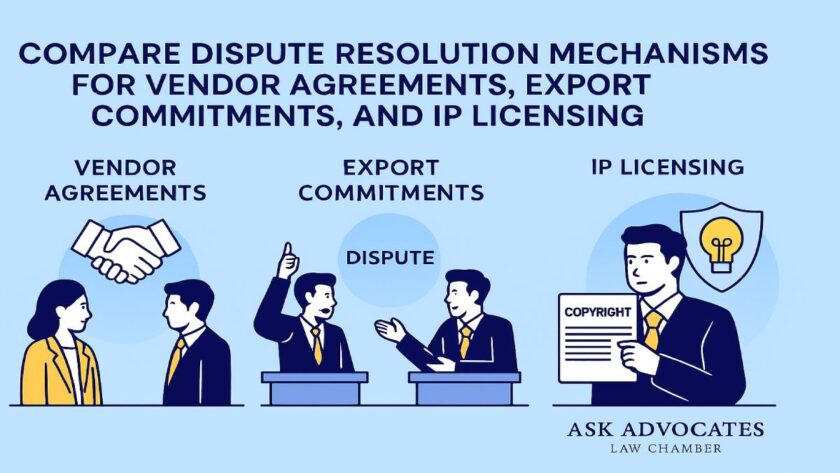In the global business world, disputes are almost inevitable. Whether it’s a disagreement between a vendor and a supplier, a conflict over export obligations, or a clash involving intellectual property (IP) licensing, every issue requires a clear and effective way to resolve differences. The method chosen to resolve disputes can greatly influence time, cost, and long-term relationships between the parties. At Ask Advocates Law Chamber, we understand that businesses today operate in complex legal environments. Hence, knowing the right dispute resolution mechanisms is not just about solving problems—it’s about protecting business interests efficiently and ensuring smoother future operations.
Compare Dispute Resolution Mechanisms for Vendor Agreements, Export Commitments, and IP Licensing: Ask Advocates Law Chamber

Understanding Dispute Resolution Mechanisms
Before diving into specific agreements, let’s understand what dispute resolution mechanisms are. In simple terms, they are methods used to resolve conflicts between parties when disagreements arise. These mechanisms can be broadly divided into two categories:
- Litigation – Disputes are resolved in court through formal legal procedures.
- Alternative Dispute Resolution (ADR) – Disputes are settled outside the courtroom, through methods like arbitration, mediation, or conciliation.
Each method has its pros and cons depending on the type of agreement, the relationship between the parties, and the nature of the dispute.
Vendor Agreements: Prioritizing Commercial Harmony
Vendor agreements are the backbone of supply chains. They define terms of supply, delivery timelines, payment conditions, warranties, and quality expectations. When disputes arise—such as delayed deliveries, defective goods, or non-payment—they can affect both business continuity and reputation.
Common Disputes
- Breach of delivery timelines
- Payment default or delayed payment
- Poor quality or defective goods
- Miscommunication on specifications or terms
Preferred Dispute Resolution Mechanisms
1. Mediation:
Mediation is often preferred for vendor disputes because it promotes open discussion and helps maintain long-term relationships. A neutral mediator facilitates dialogue and encourages both sides to find common ground. It is non-binding, meaning either party can still go to arbitration or court if no settlement is reached.
2. Arbitration:
If mediation fails, arbitration serves as a binding and faster alternative to court litigation. Most vendor contracts today include an arbitration clause. It ensures confidentiality, quick resolution, and appointment of industry experts as arbitrators. The Arbitration and Conciliation Act, 1996 in India governs these proceedings.
3. Litigation:
Litigation is the last resort and is chosen when issues involve fraud, criminal breach of trust, or large financial stakes. However, it can be time-consuming and public, which may harm business reputations.
Example:
If a supplier delivers defective materials, both parties can first try mediation to reach a compromise. If that fails, they can proceed to arbitration under the agreed clause, ensuring a confidential and enforceable award.
Export Commitments: Navigating Cross-Border Disputes
Export contracts involve multiple countries, laws, and jurisdictions. These agreements often include obligations regarding delivery terms, payment conditions, quality compliance, and documentation. Because they cross international boundaries, resolving disputes becomes more complex.
Common Disputes
- Delay in shipment or delivery
- Breach of Incoterms or international standards
- Non-payment or delayed payment by importers
- Currency fluctuation and force majeure issues
- Misinterpretation of export documentation
Preferred Dispute Resolution Mechanisms
1. International Arbitration:
For export commitments, international arbitration is the most widely used and trusted mechanism. It allows parties from different countries to settle disputes neutrally, without being subject to a single national court system. Institutions like SIAC (Singapore International Arbitration Centre), LCIA (London Court of International Arbitration), and ICC (International Chamber of Commerce) are popular choices.
Advantages include:
- Enforceable awards under the New York Convention
- Confidentiality and neutrality
- Flexibility in selecting seat and language of arbitration
2. Mediation:
Cross-border mediation is gaining popularity for smaller disputes. It promotes amicable settlements while maintaining trade relationships, especially for long-term export contracts.
3. Litigation (Limited Use):
Litigation in cross-border trade is complicated due to jurisdictional challenges and enforcement issues. Therefore, most exporters avoid litigation unless absolutely necessary, such as in cases of fraud or regulatory violations.
Example:
An Indian exporter facing payment delays from a foreign buyer can initiate arbitration under ICC rules as mentioned in the contract. The award will be enforceable in the buyer’s country if both are signatories to the New York Convention.
IP Licensing: Protecting Creativity and Innovation
Intellectual Property (IP) licensing agreements involve the transfer of rights to use patents, trademarks, or copyrights. These agreements often require clarity on scope, duration, royalties, and territorial limits. Disputes in this area can impact innovation and brand reputation.
Common Disputes
- Unauthorized use or sublicensing of IP
- Disagreement over royalty rates or payments
- Violation of licensing terms or territorial restrictions
- Ownership and infringement issues
Preferred Dispute Resolution Mechanisms
1. Arbitration:
Arbitration is highly effective for IP disputes, particularly in licensing and technology transfer agreements. It offers expertise-driven resolution and ensures confidentiality—crucial for protecting trade secrets or proprietary data.
2. Mediation:
For royalty or licensing disputes, mediation can lead to faster settlements. It allows flexibility and helps preserve ongoing collaborations between technology partners.
3. Litigation:
When the dispute involves IP ownership, validity, or infringement, litigation before the appropriate IP court or tribunal becomes necessary. In India, IPAB (now merged into the High Courts) and Commercial Courts handle such cases. Litigation ensures that judicial enforcement is available when public rights are at stake.
Example:
If a licensee uses a trademark beyond the permitted territory, the licensor can first initiate mediation to resolve the issue. Failing that, they can proceed to arbitration as per the licensing agreement or file a suit for infringement if the misuse continues.
Comparative Analysis
| Aspect | Vendor Agreements | Export Commitments | IP Licensing |
|---|---|---|---|
| Nature of Relationship | Ongoing commercial | Cross-border trade | Innovation and technology |
| Preferred Method | Mediation → Arbitration | International Arbitration | Arbitration / Mediation |
| When to Litigate | Fraud or major breach | Regulatory violations | Infringement or validity issues |
| Key Advantage | Preserves business ties | Neutral & enforceable awards | Confidential & expert-driven |
| Challenges | Enforcing awards locally | Cross-border enforcement | Balancing confidentiality & public rights |
Key Legal Considerations
- Drafting a Dispute Resolution Clause:
Every agreement should clearly define the process for dispute resolution—mentioning the seat of arbitration, governing law, and procedure. Ambiguous clauses often lead to further litigation. - Choice of Law and Jurisdiction:
Especially in export and IP agreements, parties must specify which country’s laws will apply. This helps avoid uncertainty during enforcement. - Enforceability of Awards:
Arbitration awards are enforceable under the Arbitration and Conciliation Act, 1996 in India and globally under the New York Convention. Mediation settlements, if recorded under law, also carry enforceability. - Confidentiality:
In vendor and IP matters, confidentiality clauses protect sensitive information. Arbitration and mediation both uphold this advantage compared to public court trials. - Cost and Time Efficiency:
ADR mechanisms, especially mediation, are faster and more cost-effective than litigation. This is why many modern business contracts now make ADR mandatory before litigation.
Practical Tips for Businesses
- Always include a clear dispute resolution clause in your contracts.
- Choose arbitration institutions with good reputations and transparent procedures.
- Use mediation as a first step to maintain relationships and reduce costs.
- In cross-border cases, verify if the other country is a signatory to the New York Convention.
- Maintain proper documentation and communication records to support your case if a dispute arises.
- Consult an experienced commercial and international trade lawyer to draft and negotiate agreements.
The Role of Ask Advocates Law Chamber
At Ask Advocates Law Chamber, we believe that effective dispute resolution is not just about winning a case—it’s about protecting your business interests globally. Our team of legal experts specializes in vendor contract disputes, export-related arbitration, and IP licensing conflicts.
We guide clients through every stage—from drafting robust clauses to representing them in mediation, arbitration, or litigation. With a deep understanding of both Indian and international commercial laws, our firm stands as a global force in legal defense.
Whether you are an Indian exporter, a multinational vendor, or an IP owner, we ensure your rights are protected, your risks are minimized, and your business continues without disruption.
Frequently Asked Questions
The most effective method is usually mediation followed by arbitration. Mediation encourages open discussions and helps both parties reach a mutually beneficial settlement without damaging business relationships. If mediation fails, arbitration offers a faster, confidential, and binding resolution compared to court proceedings. It ensures that commercial harmony is maintained while enforcing accountability.
Export contracts involve cross-border elements, making international arbitration the most suitable option. It provides neutrality, flexibility, and global enforceability under the New York Convention. Parties can select the arbitration seat, language, and institution (like ICC or SIAC). This avoids complications that arise from differing national laws and ensures fair treatment for both exporter and importer.
Disputes over royalties, unauthorized use, or territorial violations in IP licensing are usually handled through confidential arbitration or mediation. Arbitration is ideal when confidentiality and technical expertise are required, especially for patents or trademarks. However, if the issue involves IP ownership or infringement, it may require litigation before commercial courts or High Courts in India.
Yes. When mediation results in a written settlement signed by both parties, it becomes legally binding. In India, under the Mediation Act, 2023, such settlements can be enforced like a court decree. This gives mediation a formal legal standing while preserving its voluntary and flexible nature.
A well-drafted dispute resolution clause saves time, cost, and confusion. It specifies how and where disputes will be resolved, ensuring smooth proceedings if disagreements arise. It also prevents jurisdictional challenges, particularly in export and IP licensing contracts.
Conclusion
In today’s fast-changing global market, disputes are inevitable but manageable. What truly matters is the mechanism chosen to resolve them. Vendor agreements favor mediation and arbitration for their speed and business continuity. Export commitments rely on international arbitration for fairness across borders. IP licensing, meanwhile, values confidentiality and expertise, often choosing arbitration or specialized courts.
By understanding the differences and choosing wisely, businesses can save time, costs, and relationships. With the right legal partner—like Ask Advocates Law Chamber—you can navigate complex disputes with confidence and ensure that your business remains resilient in a competitive global landscape.
Read More
- Contractual Disputes in STPI Units: Arbitration vs. Litigation for Tech Partnerships
- Challenging or Defending GST Advance Ruling Orders: Legal Strategies and Remedies
- How the Special Valuation Branch (SVB) Impacts Transfer Pricing and Import Valuation – Legal Helpline
- Analyze recurring tax conflicts, GST refund delays, and litigation pathways for disputed exemptions
- Resolving Tax Disputes Under STPI: Navigating Section 10A/10B Challenges
- Directorate General of Foreign Trade (DGFT) — Complaint filing for export/import quality & trade disputes



